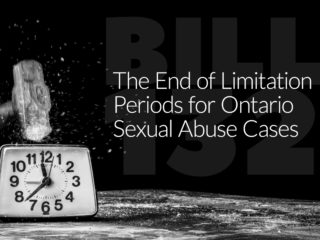In Brief
The defendant’s Anti-SLAPP motion to dismiss the defendant’s defamation lawsuit was dismissed. The defendant, and former wife of the plaintiff, publicly shared a post on Facebook alleging sexual, physical and emotional assault. While the statement was found to be a matter of public interest, the plaintiff successfully established that the claim had substantial merit and the defendant had no valid defence. Lastly, the plaintiff established that the harm he suffered was sufficiently serious that the public interest in permitting the proceeding to continue outweighed the public interest in protecting that expression. Thus, the motion was dismissed.
Victims of sexual abuse should be aware that publicly sharing their story online may result in a claim of defamation being made against them, despite the fact that their allegations are true. In such situations, an anti-SLAPP motion is an option that may quickly bring an end to the lawsuit. If considering this option, the motion should be brought promptly. Success will likely be dependent on available evidence of the truth of the defendant’s allegations. On the flip side, if a plaintiff in a defamation claim faces an anti-SLAPP motion, there must be sufficient evidence to show that the plaintiff’s claim is meritorious, there is no valid defence and, most importantly, the personal harm caused to the plaintiff by the defendant’s expression. In the case at hand, the significant impact that the Facebook post had on the plaintiff’s personal and professional reputation weighed heavily on the outcome of this motion.
Facts
The plaintiff, Smith, was an American artist, tabletop role-playing game (“RPG”) creator and adult film performer. The defendant, Nagy, was a former model and adult film performer. Smith and Nagy met in 2006 and were married the following year. Their personal and professional lives intermeshed, with Nagy being featured in Smith’s artwork and blog. They livestreamed RPG activities together and collaborated on adult films. Smith and Nagy also engaged in polyamorous relationships with other women throughout their relationship.
In 2016, Smith and Nagy separated. Over the following 18 months Nagy received counselling and was diagnosed with Post-Traumatic Stress Disorder. In 2019, Nagy publicly posted a two-page message addressed to Smith alleging that he subjected her to sexual, psychological and emotional abuse and the details of same. She encouraged readers to share the message widely. The effects on Smith’s business and public persona were far reaching. Colleagues publicly disavowed him, digital retailers refused to work with him and he was banned from conferences and other events.
Smith brought an action for defamation in June of 2019 under the simplified rules. Nagy brought a motion pursuant to s. 137.1 of the Courts of Justice Act seeking to dismiss the action on the basis that it was a strategic lawsuit against public participation. It is this Anti-SLAPP motion which was the subject of the decision.
Anti-SLAPP Motions
At the outset of this decision, Gomery J. reviewed the law pertaining to an anti-SLAPP motion. This type of motion allows a defendant to seek the dismissal of a lawsuit on the basis that it will unduly eliminate or limit legitimate criticism about a matter of public interest. It is meant to prevent others from silencing those who are speaking about issues that have significance beyond themselves.
An argument on an anti-SLAPP motion proceeds in two stages:
- The moving party must establish that the lawsuit “arises from an expression made by the person that relates to a matter of public interest”.
- If met, the onus shifts to the responding party who must establish that there are grounds to conclude:
(i) the lawsuit has substantial merit;
(ii) the defendant has no valid defence; and
(iii) the harm likely to be or which has been suffered by the plaintiff as a result of the defendant’s expression is sufficiently serious that the public interest in permitting the proceeding to continue outweighs the public interest in protecting that expression.
An anti-SLAPP motion can be brought at any time after the proceedings are commenced, however, late delivery is discouraged due to their impact on proceedings and cost implications. Once an anti-SLAPP motion is served, no further steps in the proceedings can be taken until the motion has concluded and any appeal has been disposed of. If the motion is successful, the moving party is presumptively entitled to costs on the motion on a full indemnity basis. Given the serious cost consequences, the Court of Appeal has said that these motions should be brought early in the proceedings.
Application:
STAGE 1: Does the lawsuit arise from an expression that relates to a matter of public interest?
Before embarking on her analysis, Gomery J. further summarized the law relating to this stage of the test, noting the following:
- The burden of the first stage of the test is not onerous and the case law has established that the concept of “public interest” should be interpreted in a “generous and expansive fashion”.
- The judge must consider whether some segment of the community would have a genuine interest in receiving information on the subject.
- Simply making reference to something that is of a public interest is insufficient, as is public curiosity in the matter.
- The statement must address an issue about which the public has some substantial concern because it affects the welfare of citizens, or one to which considerable public notoriety or controversy has attached.
Gomery J. found that the defendant had satisfied the first stage of the test and that her Facebook post relates to a matter of public interest. The Facebook post engaged the interests of the online adult RPG community. The reaction by Smith’s collaborators and event organizers demonstrated the communities concern over the implications of Smith’s behaviour on the reputation of the RPG community and the safety of female players he may come in contact with. While the expression stems from a personal interaction between two people, “the issues raised transcend the personal relationship”.
It should be noted that in making this decision, Gomery J. rejected the argument that all allegations of sexual misconduct by one person against another engages the public interest, even if one or more of them is a public figure.
STAGE 2:
(i): Has Smith shown that that the lawsuit has substantial merit?
Given the allegations contained in the Facebook post, Nagy conceded that Smith could prove that the Facebook post was, at least in part, defamatory.
(ii): Has Smith shown that Nagy has no valid defence?
In this stage of the test, the plaintiff must show that there are grounds on which the defendant’s defences to the defamation claim could be rejected. The defences considered were justification, fair comment and qualified privilege. Gomery J. concluded that were grounds on which these defences could realistically be rejected, and Smith therefore met this part of the test. A summary of her analysis of each of the defences is below.
- The defence of justification
In order to successfully rely on the defence of justification, the defendant must show that the statement was substantially true. Gomery J. found that Smith’s evidence provided a basis to find that Nagy’s allegations are not substantially true and that he met his burden with respect to this defence. In doing so, it was noted that this should in no way be taken to imply that Nagy will be unable to prove her allegations against Smith at trial.
- The defence of fair comment
To meet the defence of fair comment, the defendant must show the comments:
- deal with a matter of public interest;
- are based on fact; and
- are recognizable as comments, although they can include inferences of fact.
Gomery J. found that Nagy’s detailed allegations of the sexual assaults were based in fact and therefore not recognizable as comment. She could not therefore conclude that the defence of fair comment has a real prospect of success.
- The defence of qualified privilege
A publication is privileged if the publisher has an interest, or duty, legal social, moral or personal, to publish the information in issue to the person to whom it is published, and the person to whom it is published has a corresponding interest or duty to receive it. The privilege is exceeded if the communication is made to an audience that extends beyond those with a legitimate interest in the communication or duty to receive it.
Gomery J. did not find this to be a valid defence. Even if Nagy successfully established that she had an interest in disclosing Smith’s conduct to women who had an interest in receiving her disclosure, that privilege would be exceeded because Nagy made the communication to the world at large.
(iii): Has Smith shown that the harm caused or likely to be caused by the expression is outweighed by the public interest in protecting Nagy’s expression?
In this last step, it must be decided if it is in the public interests to dismiss the action even if the plaintiff has established that the defendant has no valid defence. In conducting this balancing exercise, the judge must consider the harm suffered by the plaintiff, the public interest in allowing the underlying proceeding to continue, and the public interest in protecting the underlying expression.
Gomery J. found that the harm suffered by Smith as a result of the Facebook post was sufficiently serious that it outweighs the public interest in protecting Nagy’s expression. In doing so, she considered the following:
- sexual assault is very often under reported and there is a public interest in protecting expression and debate on the topic of sexual and domestic violence and abuse.
- victims of violence should not be inhibited from disclosing what they have experienced because they fear being sued for defamation.
- there was no evidence that Nagy or others had been inhibited from expressing themselves as a result of the action. Nagy considered the possibility that she may be sued for libel and shared the post despite this.
- at present, there was no significant power imbalance between the two parties.
- Nagy’s allegations have had a devastating impact on Smith’s business and reputation
- Nagy had not filed a criminal complaint
- Smith had not been able to obtain a retraction
After weighing the public interest in allowing the case to proceed and the public interest in encouraging debate on the matters raised in the Facebook post, Gomery J. concluded that the case should be determined on its merits and the motion dismissed.












